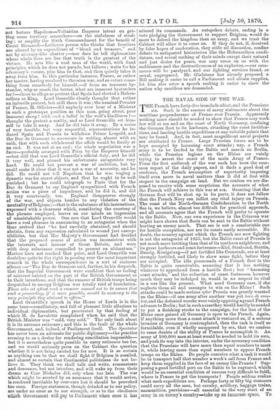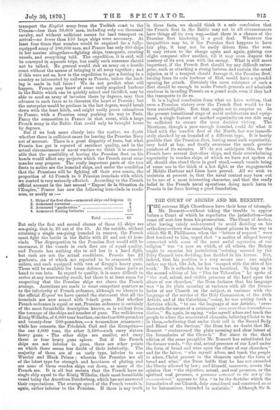THE NAVAL SIDE OF THE WAR. T HE French have forty-five
ironclads afloat, and the Prussians. six. Such is the essence of many statements about the maritime preponderance of France over Prussia. Apparently nothing more should be needed to show that France may work- her will at sea and on the coast of North Germany, confining the German fleet to its harbours, attacking the coast fortifica- tions, and landing hostile expeditions at any suitable points that may be found. And, in fact, most magnificent naval projects are attributed to France. Large Prussian forces are to be kept occupied by harassing coast attacks ; nay, a French army is to be landed in the Baltic and march on Berlin, while the Prussian legions on the Rhine are vainly- trying to arrest the onset of the main Army of France._ From the first outbreak of the war such has been the com- mon report of the daily papers, and it finds a good deal of credence, the French assumption of superiority imposing- itself even more in naval matters than it did at first with respect to the campaign on land. But we confess we are dis- posed to receive with some scepticism the accounts of what the French will achieve in this war at sea. Granting that the German fleet will be shut up in its ports, it does not follow that the French Navy can inflict any vital injury on Prussia.. The coast of the North-German Confederation to the North Sea is, we believe, almost too difficult for practical approach, and all accounts agree that the French will prefer to operate- in the Baltic. Now, our own experience in the Crimean war might have shown that fleets can be sent to the Baltic without hurting an enemy much. That sea is not a comfortable one for hostile occupation, nor are its coasts easily accessible. No doubt, the country against which the French are now fighting is not the antagonist of 1855, but the Baltic coast of Prussia is not much more inviting than that of its northern neighbour, and its great harbours and coast fortresses—Kiel, Stralsund, Stettin, Danzig, Konigsberg—if not fortified like Cronstadt, are at least strongly fortified, and likely to show some fight, before they are occupied. The idle promenade of a French fleet in the Baltic is quite conceivable, assuming that it has nothing whatever to apprehend from a hostile fleet ; but "harassing coast attacks," and the reduction of coast fortresses, however much they may be indulged in, would in no respect be vital in a war like the present. What need Germany care, if she- neglects them all and manages to win on the Rhine ? Such attacks could be made serious cycler Prussia was greatly worsted on the Rhine—if one army after another was put hors de com- bat, and the defeated wrecks were vainly opposing a grand French advance to Berlin; but in such acasethey would hardly beneeded to put a finishing stroke to the campaign, for the line of the- Rhine once gained all Germany is open to the French. Again, if anything more than a coast attack is ventured on, if a serious- invasion of Germany is contemplated, then the task is itself so- formidable, even if wholly unopposed by sea, that we confess- to some doubts of the ability of France to accomplish it. An. army of 100,000 men at least would be needed to hold its own, and push its way into the interior, under the necessary condition, that the Prussians will have more than equal numbers to meet• it, while leaving more than equal numbers to oppose French troops on the Rhine. Do people conceive what a task it would. be to transport half that number a week's sail from France and keep them supplied in the face of an enemy like Prussia ? Sup- posing a good fortified port on the Baltic to be captured, which- would be an essential condition of success very difficult to fulfil, where is France to get the transports ? People seldom realize what such expeditions are. Perhaps forty or fifty big steamers could carry all the men, but cavalry, artillery, baggage trains, ammunition, provisions—all essential to the very start of an army in an enemy's country—take up an immense space. To transport the English army from the Turkish coast to the Crimea—less than 30,000 men, including only one thousand cavalry, and without sufficient means for land transport on arrival—no fewer than 150 large ships were necessary. At least four times that number would be required for a fully- equipped. army of 100,000 men, and France has only 400 ships in her marine altogether—fighting ships, transports, coasting vessels, and everything told. The expedition, it is said, will be conveyed in separate trips, but really such nonsense should not be talked. No general would risk an army on a hostile coast without the means of bringing it all away together ; and if this were not so, how is the expedition to get a footing in a country so intersected by railways as Prussia, unless the land- ing is made in full force ? We do not predict what will happen. France may know of some easily acquired harbour in the Baltic which can be quickly seized and fortified, may be able to send an army of invasion there by degrees, may then advance in such force as to threaten the heart of Prussia ; but the enterprise would be perilous in the last degree, would break down with the least hitch, and might easily prove calamitous to France, with a Prussian army pushing its way to Paris. Fancy the commotion in France in that event, with a large French army in the Baltic that could only be brought home by degrees. But if we look more closely into the matter, we doubt whether there is sufficient cause for leaving the Prussian Navy out of account. There is a great disparity of force, but what Prussia has got is reputed of excellent quality, and in the actual circumstances of naval warfare we think it is conceiv- able that the possibility of having the Prussian fleet on his hands would affect any projects which the French naval com- mander may propose. The really important parts of the two fleets to notice are the ironclad ships, and under the condition that the Prussians will be fighting off their own coasts, the proportion of 45 French to 6 Prussian ironclads with which we started is very seriously affected. According to the French official account in the last annual " Expose de la Situation de l'Empire," France has now the following iron-clads in readi- ness, or nearly so :—
1. Ships of the first class—armoured ships and frigates 18 2. Armoured corvettes 8 3. Armoured " garde-cotes " 4 4. Armoured floating batteries 15 Total 45
But only the first and second classes of these 45 ships are sea-going, that is, 26 out of the 45. At the outside, without retaining a single sea-going ironclad in reserve, the French must fight the battle in the Baltic with 26 and not 45 iron- clads. The disproportion to the Prussian fleet would still be enormous, if the vessels in each fleet are of equal quality, and Prussia has nothing else to aid her in a hard fight, • but such are not the actual conditions. Prussia has 22 gunboats, six of which are reported to be armoured, swift sailers, and each equipped with two of Krupp's heavy guns. These will be available for home defence, with home ports at hand to run into. In regard to quality, it is more difficult to arrive at any trustworthy result, but there is at least room for suspecting that the Prussian ships are above the French average. Assertions are made in some competent quarters as to the inferiority of French ordnance, although we observe in the official Expose we have quoted the statement that all the ironclads are now armed with 9-inch guns. But whether French ordnance is equal or not, Prussian ordnance is certainly of the most formidable description known, as is evident from the tonnage of the ships and number of guns. The well-known Konig Wilhelm, of 6,000 tons' burthen, carries four 600-pounders and twenty-four 300-pounders, — a tremendous armament ; while her consorts, the Friedrich Carl and the Kronprinz- the one 4,000 tons, the other 3,400—each carry sixteen heavy guns. • The other ships are smaller, and 'Carry three or four heavy guns apiece. But if the French ships are not inferior in guns, there are other points on which there seems less doubt of their inferiority. The majority of them are of an early type, inferior to our Warrior and Black Prince ; whereas the Prussian are all of the latest type for strength and heaviness of plating, and are none of them wooden ships cut down, as many of the French are. It is all but certain that the French have no single ship equal to the Konig Wilhelm, their most formidable vessel being the American Dunderberg, which has not answered their expectations. The average speed of the French vessels is, again, rather inferior to the Prussian. If there is any truth in these facts, we should think it a safe conclusion that the French fleet in the Baltic may not in all circumstances have things all its own way,—that there ie a chance of the Prussian fleet hindering it a good deal. Whatever the inequalities may be, if the Prussian fleet happens to have fair play, it may not be easily driven from the seas. It may return to the charge again and again, gaining one slight conquest after another, till it may even dispute the mastery of its own seas with the enemy. What is still more important, if the French fleet should try any difficult enter- prise, such as attacking a strong fortress, and sustain the usual injuries, or if a tempest should damage it, the Prussian fleet; issuing from its safe harbour of Kiel, would have a splendid opening for attack. Certainly the mere existence of such a fleet should be enough to make French generals and admirals cautious in invading Prussia on a grand scale, even if they had the transports to do so.
It is a logical conclusion from what we have written, that even a Prussian victory over the French fleet would be far from unintelligible. But that ought not to surprise us. In the present transitional stage of naval architecture and equip- ment, a single feature of marked superiority on one side may be sufficient to ensure the most decisive victory. The Merrimac, though a poor enough ironclad, could do what it liked with the wooden fleet of the North, but was immedi- ately checked by an ironclad of a different type, It is barely possible that the Prussian fleet, having some such superiority, may hold at bay, and finally overcome the much greater numbers of its enemies. We do not anticipate this, for the French have several first-class ships, and their overwhelming superiority in wooden ships, of which we have not spoken at all, should also stand them in good stead,—such vessels being of some use in the thick of a hot fight, as the engagements of Mobile Harbour and Lissa have proved. All we wish to maintain at present is, that the naval contest may turn out to be one of a most interesting character, and that the ready belief in the French naval operations doing much harm to Prussia is far from having a good foundation.































 Previous page
Previous page